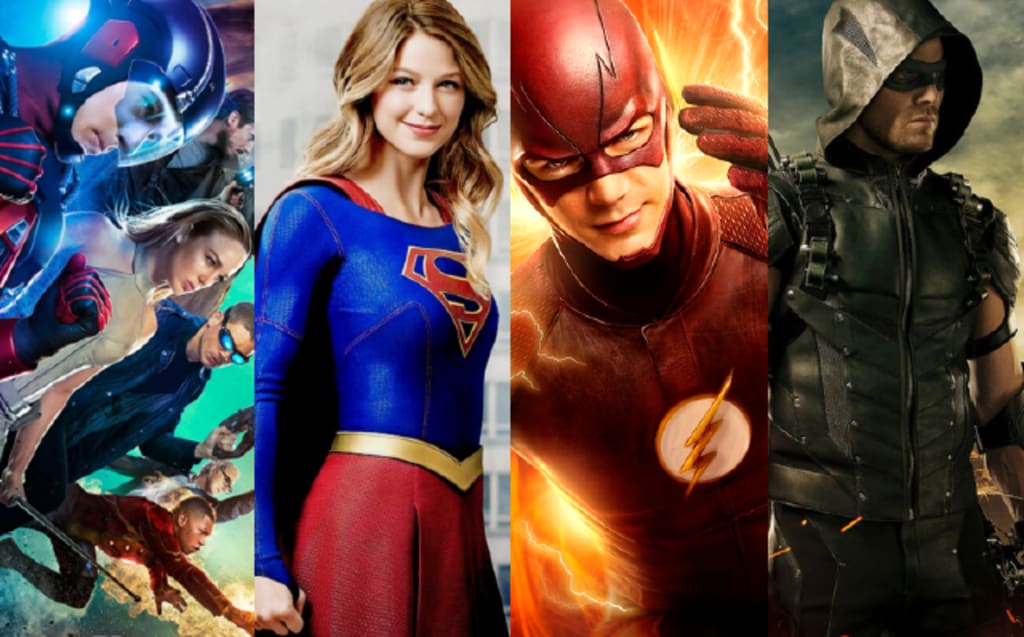Superheroes and 21st Century Multimedia
Source Material versus Adaptation

Due in large part to not only the Marvel Cinematic Universe and the currently-expanding DCEU, superheroes and their role in popular culture is at the forefront of people’s minds.
Movie theaters have at least one superhero film a year, and have since roughly 2008. So, for almost 10 years, now, we have had at least one superhero film within a connected universe coming out nearly every year. Television shows centering around superheroes are becoming more commonplace, both on network television and on streaming services such as Netflix.
But, with the advent of projects that are intended to be more commercial comes changes to what is commonly considered to be canon to these stories, changes that long-term fans of these comics find offensive and/or outrageous.
Before we discuss the advent of superhero media in film and television, though, let’s discuss what it means to be a superhero just by definition. The term ‘super’ is often considered an enhancement of anything it comes before in a combined word.
Factoring this in, what is it that it enhances? What does the word ‘hero’ truly mean? From the Wikipedia article ‘Hero’, this is the meaning given to it: A hero (masculine) or heroine (feminine) is a person or main character of a [fictional] work who, in the face of danger, combats adversity through impressive feats of ingenuity, bravery or strength, often sacrificing their own personal concerns for a greater good.
For the sake of honesty, the word in the brackets replaces ‘literary’ since this definition has long since been expanded to film and television.
Now, it is true that ‘superhero’ has its own personal definition, but today’s commercial cash-ins prefer to use the basic term of ‘hero’. So, it is that definition we will use, with the additive of ‘super’ being what it is intended to be: an enhancement of the source.
Now, let us break down the above italicized sentence further, to understand what it is that is being ‘enhanced’ by the additive ‘super’.
The first part is, of course, obvious at first glance, but we now live in a world where gender identity has become an aspect to consider. For the sake of not getting bogged down in gender politics, one should assume that the gender which the person identifies is the appropriate appellation, regardless of how far along they are in the process of switching genders.
The second establishes that they can be either a real person or a character in a work of fiction who, in the face of danger, combats adversity with three factors.
These three factors are ingenuity (smarts and cunning), bravery (the willingness to be a shield for others or rush towards danger rather than away from it), and strength (physically capable of putting a beatdown on someone, mentally able to push past the fight or flight instinct and engage in critical thinking, and emotionally able to handle the events unfolding).
The final part is where we hit a serious snag: often sacrificing their own personal concerns for a greater good. This is not only regarding their personal safety (mental, physical, and emotional) but also in reference to the values they hold and it is a key source of contention between long-term fans of heroes/heroines who come from the comics and the adaptations that have been on the market and, from all appearances, will continue to be so for some time.
The greatest of all these contentions is the fact that "heroes don’t kill."
Soldiers in the military are trained to kill in defense of themselves and others, putting themselves as a line between the common citizen and indomitable foes. Is this not the definition of a hero?
Police officers are trained to capture criminals, of course, and they do so quite frequently, but there have been times when a criminal has forced them to take decisive and deadly action, usually when said criminal is threatening dozens of innocent lives or more. When they do so, they are hailed as heroes (though this has become muddled due to incidents of police brutality, it is still true).
So, when it comes to the superheroes of comic lore, should they not be held to that same standard? For the common criminals they stop, of course, they should take them alive so long as it’s possible, just as police officers do, especially when you factor in special training like Batman’s or the invulnerability of Superman (outside of Kryptonite).
But what of their truly-threatening villains, whether they are metahuman threats like the Reverse-Flash, extra-terrestrial threats like General Zod, or simply brilliant and insane threats like Lex Luthor and the Joker?
These would be on the level of the indomitable foes and other enemies that soldiers are intended to face. These often pose threats to the common man more than once, as they ‘break out’ of Arkham Asylum, the Phantom Zone, etc. and continue their previous rampages, albeit with more cunning at times.
The first time, capture is understandable, but what of the second, or the third, or tenth time this occurs? Where should the line be drawn?
Now, the obvious reason for the continued survival of supervillains and the lack of willingness to kill them on the part of the superheroes is that the writers and artists want to keep these characters around so they can be used.
As we have seen in the television show Arrow with John Barrowman’s Malcolm Merlyn and may see in its sister-show, DC’s Legends of Tomorrow who have added Neal McDonough’s Damien Darhk as a season regular in its third season, there is a limit to how often a villain can be on the radar of a hero before they either become a joke of a threat, or before they end up being an ally out of necessity.
By the time of the fifth season finale of Arrow, many fans (even those who like Barrowman) were quite happy to see the supposed end of Malcolm Merlyn because he has become both a joke and an ally out of necessity, which, considering he is one of Green Arrow’s most deadly foes in the comics (The Dark Archer), gives a good example of straining the suspension of disbelief for viewers.
Within the realm of comics, it is inherently possible and perhaps even reasonable for them to adhere to the personal values of the superheroes and allow them to maintain that nature. But in adaptations that often are intended to mirror the real world, superheroes cannot maintain certain aspects of their morals and still maintain the title of hero.
Comic heroes stand as champions to the world, intended to be a beacon of light for people to cling to in times of darkness; but the people in comics often find hope in those values because they’re meant to.
In the real world, we have the corruption in politics, from the highest offices to the lowest. We have rapists who, in some states, can be charged with sexual abuse of a child and somehow only get two or three years, most of which is spent in a rehab center/halfway house.
We have people dying of various diseases and an uncaring Big Pharma who only care about their bottom line and how big a price they can stick on something. We in the real world find hope in things that very different from what those in the comics would. We see a politician getting their just desserts by getting impeached or arrested for treason, we find hope; we see news that a rapist has been given a minimum of 25 years without chance of parole for what they’ve done to another human being, and we have hope; we see those developing treatments being exposed for holding back a less-expensive treatment, and we have hope.
Superheroes in adaptations, by their very nature, cannot adhere to what is done in the comics because the values and problems in comics can often be different from the real world.
What if Superman refused to play ball with corrupt politicians, even if they espoused to believe in "the American way?" What if Wonder Woman used her Lasso to ensure that a rapist had to confess to what he had done? What if Batman exposed corruption in a pharmaceutical company beyond the latest ploy by the Joker or someone?
These things would bring hope to our world, and it is often in our world that these adaptations take place, especially in the past decade.
For superheroes to maintain the title of hero in modern media such as films and television, or even contemporary novels (graphic or not) they will have to adhere to the enhancements on the previously-mentioned aspects: they must show heightened cunning and intelligence when dealing with their foes, be willing to brave dangers that put them in the way of that which would harm them, even if only on an emotional or mental level, and be willing to make personal sacrifices, including their moral codes, in order to ensure the safety of the common citizen.
So long as they do not enjoy the act of taking a life, then they maintain the title of hero because only a monster (or a villain) enjoys taking the life of another.
About the Creator
J.D. Bentz
Sci-Fi writer, Superhero-TV Lover & Critic, Passing Comics Nerd, Star Wars nut, has a tendency towards sarcastic commentary on world events






Comments
There are no comments for this story
Be the first to respond and start the conversation.